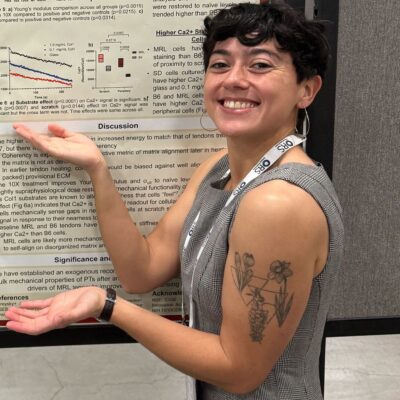Student Spotlight: Marguerite Pacheco

April 28, 2025
Marguerite Pacheco is a doctoral candidate in biomedical engineering from Montclair, New Jersey. She earned her bachelor’s degree at Smith College and now studies tendon healing under the guidance of Nelly Andarawis-Puri at Cornell.
What is your area of research and why is it important?
I study tendon healing. If you have ever had a tendon injury, like jumper’s knee, and it never really felt normal again, that’s because it likely has not fully healed! Us adult mammals heal acute tendon injuries via scarring, which results in pain and limitations on motion, and which never resolves. I use the MRL/MpJ mouse model, which can restore the functionality of their tendons after acute injury, to develop a translatable protein therapeutic for tendon injuries. Excitingly, I recently demonstrated that my protein therapeutic can fully restore functional properties of patellar tendons after an acute injury!
What are the larger implications of this research?
Tendon injuries are debilitating injuries that particularly impact blue collar workers and the elderly. While these injuries aren’t lethal, they can drastically reduce one’s ability to support themselves independently, leading to other poor health outcomes and socioeconomic burden. Current treatment options are for symptom management, such as pain medication, anti-inflammatories, and physical therapy, and even tendon reattachment surgeries frequently have retear rates of over 50%. This is because no current treatment resolves the underlying scar-mediated healing. My work seeks to address this gap and reduce the burdens of this injury for all peoples.
What does it mean to you to be a Bouchet Scholar?
In short, it’s an honor. When I look at current Bouchet Scholars, I can point to every person and count off the many material impacts they have had in their communities. Many of the leaders who showed me that I can impact our communities, both in and out of the academy, were Bouchet Scholars. These people faced daunting challenges and chose not only to forge on, but to do so uncompromisingly, which is ever more vital in the face of repression and attacks on marginalized people. To me, it is both an honor and a charge to uphold these values, unflinchingly.
How do you exemplify the five pillars of the Bouchet Society—character, leadership, advocacy, scholarship, and service?
I was elected to the e-board of the Latine Graduate Student Coalition and worked with the Graduate and Professional Student Diversity Council to develop community support and professional opportunities that increase retention for marginalized grads. In 2020-21, I worked with a vaccine outreach group Vaccination Conversations with Scientists and our local Biomedical Engineering Society (BMES) chapter to do science outreach and education, which I still participate in through BMES, Expanding Your Horizons, and CURIE Academy. In the grad union, I became a bargaining committee member and fought for the most vulnerable people at this institution to have fair and equal treatment throughout their time here at Cornell.
What are your hobbies or interests outside of your research or scholarship?
I love dancing, soccer, embroidery, and supporting movements that protect and empower the working class.
Why did you choose Cornell to pursue your degree?
Aside from the basic answer that Cornell has incredible biomechanical and regenerative tissue engineering research, I chose to come to Cornell because of the field of biomedical engineering’s culture of outreach and service. The grads in my program really stressed that, while we are here to do our science and get a degree, we should be able to maintain other commitments such as roles within community and professional organizations. They not only stressed that point but really exemplified it.
